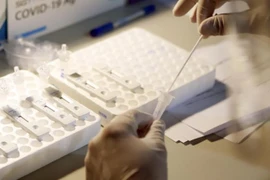Hanoi (VNA) – Secretary of the Party Committee of Hanoi Dinh Tien Dung and Chairman of the municipal People’s Committee Chu Ngoc Anh on July 25 inspected traffic regulating activities of the city and gave directions on ways to prevent congestion in gateways to the capital city amid travel restrictions as part of Hanoi's social distancing measures.
From 6 am on July 24, as part of efforts to implement Directive 17/CT-UBND on pandemic prevention and control measures, Hanoi has banned all vehicles from entering the city, except for vehicles serving pandemic prevention and control activities, public services, diplomatic mission, and those for transport of workers, experts and necessities, which are allowed to run on the so-called "green route".
To enforce the ban, 22 checkpoints have been set up at the main routes leading into the city. At each checkpoint, the city police, in co-operation with traffic inspectors, medical workers and civil defence officers of districts and towns are working around the clock to monitor the movement of all vehicles and people returning to or travelling out of the city.
As a consequence, congestion has occurred at a number of checkpoints, including those in Phap Van-Cau Gie (National Highway 1) and Phu Dong (National Highway 1B), causing difficulties for travelers.
After inspecting the situation at the Phap Van-Cau Gie checkpoint, the city leaders found that the reasons behind the traffic jam was a lack of planning for regulating the flow of traffic from afar, as well as timely provision of information to drivers about requirements for entering the city, so that they can choose a more suitable route.
The city leaders asked the police of Hanoi to propose to the Public Security Ministry to position a police team at the Vuc Vong crossroad in Ha Nam to guide vehicles to take other routes instead of crossing Hanoi.
The Traffic Police Agency under the Ministry of Public Security has agreed with the proposal and pledged to send the team to the crossroad soon.
The capital city has applied strict social distancing measures as stipulated in the Prime Minister's Directive 16 from 6am on July 24 as the COVID-19 pandemic is developing complicatedly.
The measures to stamp out worsening outbreaks of COVID-19 will be in place for 15 days. Besides Hanoi, 19 southern provinces and cities, including the southern largest hub of Ho Chi Minh City are also implementing social distancing measures under Directive 16.
Under the measures, all public transport services including buses, taxis, contract vehicles and coaches are banned, excluding those in service of pandemic prevention and control and transporting workers and experts. Motorbikes are also suspended from transporting passengers.
People in the city are asked to stay at home and only go outside in necessary cases like business trips, working at essential businesses (State agencies, factories, essential shops and service providers), buying food and medicines, or emergencies such as medical issues, fires or natural disasters.
Masks are mandatory in public places. People must maintain a distance of two metres in public places, and must not congregate in groups larger than two outside of hospital, workplaces, or schools.
People are required to submit health declaration forms via website www.tokhaiyte.vn or Ncovi and Bluezone apps. Those who have symptoms such as fever, coughing or difficulty breathing must contact local medical establishments for further instructions.
Non-essential services and businesses must close.
The businesses and services that are still allowed to operate include factories, production facilities, transport projects, construction sites, essential businesses or suppliers (food, medicines, utility, gas and oil, etc.), educational institutions, banks and treasuries along with bank-related and business support activities (such as notaries and attorney offices, registration offices, etc.), securities, post offices, import and export activities, medical examination and treatment, and funeral services.
People are asked to hold off from organising weddings, while funeral services must not have more than 20 attendants and will be monitored by the local health authorities.
All unnecessary meetings are banned.
Production businesses, service establishments, and industrial zones must strictly observe COVID-19 prevention and control measures./.





























